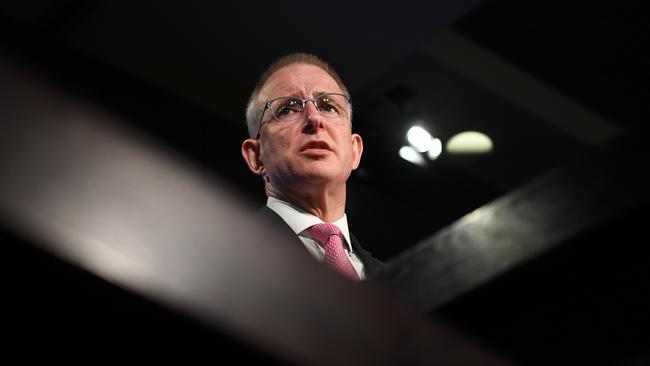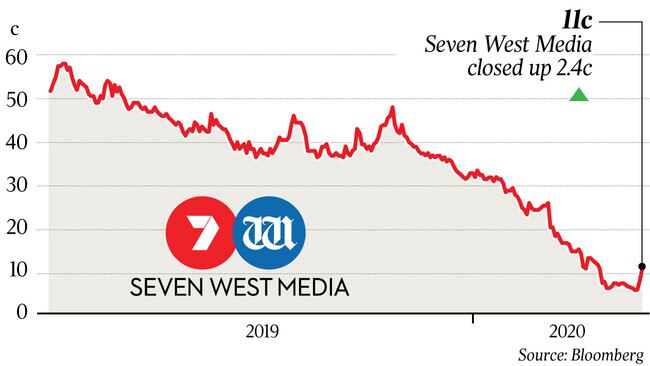Coronavirus relief: $90m in support, content rules to help media survive
Media bosses argue the $91m short-term coronavirus financial relief package falls short of much-needed wider structural reform.

Australian media bosses were left disappointed with the Morrison government’s $91m short-term coronavirus financial relief package, arguing it falls short of much-needed wider structural reform, including urgent regulatory crackdown on technology giants Google and Facebook.
The long-awaited package stopped short of addressing wider industry demands including the relaxation of Australian media ownership laws and forcing tech giants to pay for news stories carried on their platforms.
Instead, it has provided temporary relief to commercial television and radio broadcasters, as well as regional publishers which have been buffeted as the economy grinds to a halt.
Communications Minister Paul Fletcher outlined $41m in broadcast spectrum tax rebates to commercial TV and radio broadcasters for the year, plus $50m for regional journalism as companies, including Australian Community Media and the Elliot Newspaper Group, have stopped publishing some newspapers and stood down staff.
The Morrison government has also agreed to suspend Australian drama, children’s and documentary content quotas this year following years of lobbying by the commercial television industry.
It will also fast-track its work to determine the future extent of Australian content obligations on commercial TV broadcasters, and whether they should apply to streaming services.
Patrick Delany, chief executive of pay-TV and streaming group Foxtel, led the criticism, saying it is “extremely disappointing so little attention has been given to subscription television in the relief package despite it serving almost a third of Australian homes”.
“We are the most disrupted part of the television industry, a trend that is amplified with the impact COVID-19 and the lack of recognition in the package highlights a fundamental misunderstanding of industry dynamics within government.
Mr Delany said subscription TV remains the most heavily regulated media businesses in Australia working under a regime that was designed before the digital onslaught.
“Current regulation is effectively a discriminatory tax on Foxtel which impacts our ability to compete on a level playing field with free to air television,” he said. Foxtel is majority owned by News Corp, publisher of The Australian.

Nine Entertainment CEO Hugh Marks and Seven West Media CEO James Warburton welcomed the government’s package – which stands to benefit free-to-air broadcasters — but called for more broader regulatory action to ensure the industry’s long-term future.
“The current COVID-19 crisis only serves to further highlight the need for urgent long term solutions to the regulatory imbalance between highly regulated domestic media players and unregulated international technology companies,” Mr Marks said.
Seven’s Mr Warburton said the impacts of COVID-19 on the industry “further highlights the urgent need for regulatory reform to ensure media businesses in Australia are sustainable in the long term”.
Seven has been among the hardest hit by the downturn, with the broadcaster more reliant on broadcast advertising, leaving it more exposed to a downturn. Seven has been struggling under a more than $500m debt load. Shares in the broadcaster jumped more than 30 per cent on Wednesday given the prospect of relief on spectrum fees. Shares in Nine were up 2.1 per cent.
Mr Fletcher, who has been criticised by media bosses privately for being too slow to respond to their pleas for help, told The Australian enforcing the recommendations of the competition regulator that digital platforms pay media companies through a code of conduct was “important priority for the government.”
“The government has very clear expectations as to what comes out of that (negotiations). We're expecting a report pretty soon on progress … We've been pretty clear if it doesn't produce the outcomes we want, then we stand ready to act more directly.”
Mr Fletcher said he expected the tech platforms to negotiate a “serous commercial engagement” between tech platforms and media companies, or the government would force a deal upon the tech giants.
Ian Audsley, the CEO of regional TV broadcaster Prime Media, said Mr Fletcher had “delivered something that has a firm basis in reality – something meaningful which reflects our sector’s separate and independent existence.
“Whether it is enough, only time will tell,” Mr Audsley told The Australian.
Beverley McGarvey, the boss of Network 10, which is owned by US entertainment giant ViacomCBS, said the government’s package is a “a great first step” but more needs to be done.
The government’s announcement, which was foreshadowed by The Australian on Tuesday, comes a day after regional publisher Australian Community Media became the latest to suspend the publication of several newspapers and stand down staff as the coronavirus crisis wipes out advertising revenue.
ACM boss Antony Catalano had urged Mr Fletcher to relax media ownership laws and provide financial assistance to the struggling sector. This week
Other media executives, including News Corp Australia boss Michael Miller and HT&E CEO Ciaran Davis have also urged the Morrison government to act swiftly to help the sector, which was struggling even before COVID-19 from the relentless competition from Google and Facebook.







To join the conversation, please log in. Don't have an account? Register
Join the conversation, you are commenting as Logout